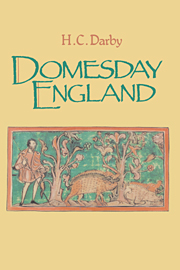Book contents
- Frontmatter
- Contents
- List of Maps
- Preface
- List of Abbreviations
- Chapter I THE DOMESDAY INQUEST
- Chapter II RURAL SETTLEMENTS
- Chapter III POPULATION
- Chapter IV ARABLE LAND
- Chapter V GRASSLAND, MARSH AND LIVESTOCK
- Chapter VI WOODLAND AND FOREST
- Chapter VII ANNUAL VALUES
- Chapter VIII DEVASTATED LAND
- Chapter IX INDUSTRY
- Chapter X BOROUGHS AND TOWNS
- Chapter XI THE WELSH MARCH
- Appendix 1 General Statistical Summary by Domesday Counties
- Appendix 2 Summary of Categories of Rural Population
- Appendix 3 Categories of Rural Population by Domesday Counties
- Appendix 4 Churches and Priests by Domesday Counties
- Appendix 5 The Shropshire Ploughland Formulae
- Appendix 6 The Leicestershire Ploughland Formulae
- Appendix 7 The Yorkshire Ploughland Formulae
- Appendix 8 References to Marsh
- Appendix 9 References to Forests
- Appendix 10 References to Hawks and Renders of Hawks
- Appendix 11 References to firma unius noctis/diei
- Appendix 12 Annual Values for Rural Holdings in 1086 by Domesday Counties
- Appendix 13 References to Iron and Renders of Iron
- Appendix 14 Statistical Summary of Mills by Domesday Counties
- Appendix 15 References to Vineyards
- Appendix 16 Statistical Summary of Boroughs
- Appendix 17 References to Markets
- Appendix 18 References to Mints
- Appendix 19 Extension and Translation of examples of Domesday entries
- Appendix 20 The Domesday Geography of England: Editors and Contributors
- Appendix 21 On the Writing of Domesday Geography
- Index
Chapter X - BOROUGHS AND TOWNS
Published online by Cambridge University Press: 05 June 2012
- Frontmatter
- Contents
- List of Maps
- Preface
- List of Abbreviations
- Chapter I THE DOMESDAY INQUEST
- Chapter II RURAL SETTLEMENTS
- Chapter III POPULATION
- Chapter IV ARABLE LAND
- Chapter V GRASSLAND, MARSH AND LIVESTOCK
- Chapter VI WOODLAND AND FOREST
- Chapter VII ANNUAL VALUES
- Chapter VIII DEVASTATED LAND
- Chapter IX INDUSTRY
- Chapter X BOROUGHS AND TOWNS
- Chapter XI THE WELSH MARCH
- Appendix 1 General Statistical Summary by Domesday Counties
- Appendix 2 Summary of Categories of Rural Population
- Appendix 3 Categories of Rural Population by Domesday Counties
- Appendix 4 Churches and Priests by Domesday Counties
- Appendix 5 The Shropshire Ploughland Formulae
- Appendix 6 The Leicestershire Ploughland Formulae
- Appendix 7 The Yorkshire Ploughland Formulae
- Appendix 8 References to Marsh
- Appendix 9 References to Forests
- Appendix 10 References to Hawks and Renders of Hawks
- Appendix 11 References to firma unius noctis/diei
- Appendix 12 Annual Values for Rural Holdings in 1086 by Domesday Counties
- Appendix 13 References to Iron and Renders of Iron
- Appendix 14 Statistical Summary of Mills by Domesday Counties
- Appendix 15 References to Vineyards
- Appendix 16 Statistical Summary of Boroughs
- Appendix 17 References to Markets
- Appendix 18 References to Mints
- Appendix 19 Extension and Translation of examples of Domesday entries
- Appendix 20 The Domesday Geography of England: Editors and Contributors
- Appendix 21 On the Writing of Domesday Geography
- Index
Summary
Whatever the difficulties of interpretation, the Domesday information for rural England is systematically presented and is remarkable for the detail it provides. When we turn from the countryside to the towns all is different. No instructions about towns appear in the preamble to the Ely Inquest, and the information presented to us is as unsystematic as it is incomplete. It is usually impossible to form any clear idea of the size of a town or of the economic and other activities that sustained it.
The Anglo-Saxon word ‘burh’ or borough signified a fortified centre, and the fact that it later came to mean town does not justify the conclusion that all burh-building resulted in the creation of urban settlements. There has been much debate about whether defence or trade provided the impetus to urban development, but surely both were important. The security of fortified centres encouraged trading activity, while, in turn, trading centres needed to be fortified for protection. Some sites were favourable for trade, and here burhs, or maybe villages, developed into flourishing towns – at bridgeheads on rivers, at the confluences of tributaries, at the crossing-places of route-ways, or near convenient gaps in hill country. Long before the Norman Conquest, a force had begun to operate which was to give to the English town its essential character – that of a trading centre.
- Type
- Chapter
- Information
- Domesday England , pp. 289 - 320Publisher: Cambridge University PressPrint publication year: 1977



